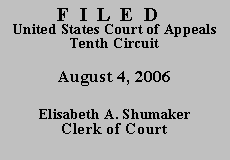
UNITED STATES COURT OF APPEALS
TENTH CIRCUIT
Byron White United States Courthouse
1823 Stout Street
Denver, Colorado 80257
(303) 844-3157
Elisabeth A. Shumaker Douglas E. Cressler
Clerk Chief Deputy Clerk
August 16, 2006
TO: ALL RECIPIENTS OF THE ORDER
RE: 06-7013, United States v. Scarborough
The Order filed August 4, 2006, contained a clerical error. The Court hereby amends the Order and has attached it hereto. The corrected Order is filed nunc pro tunc to the original filing date of August 4, 2006.
Sincerely,
Elisabeth A. Shumaker, Clerk of Court
By:
Deputy Clerk
encl.

UNITED STATES OF AMERICA,
Plaintiff-Appellee,
v.
STANLEY DAYNE
SCARBOROUGH,
Defendant-Appellant.
Before KELLY, McKAY, and LUCERO, Circuit Judges.
Mr. Scarborough, following his loss on appeal, filed this motion for resentencing under Blakely v. Washington, 542 U.S. 296 (2004), and claimed ineffective assistance of counsel.
Although Mr. Scarborough did not make a Blakely objection at sentencing, he did raise it on direct appeal. We determined that the district court's imposition of the two-level enhancement was plain error, even though Blakely had not been decided at the time of Mr. Scarborough's sentencing, but we did not find that it seriously affected his substantial rights. See Scarborough, 134 Fed. Appx. at 243. At this time, Mr. Scarborough is not entitled to relief under Blakely because his § 2255 motion is a collateral attack on his sentence. See United States v. Bellamy, 411 F.3d 1182, 1188 (10th Cir. 2005) (holding that Blakely principles do not apply retroactively to cases on collateral review).
The trial court erroneously concluded that Mr. Scarborough's ineffective assistance of trial counsel claim was waived when he failed to raise the issue on direct appeal. See Massaro v. United States, 538 U.S. 500, 504 (2003) ("We hold that an ineffective-assistance-of-counsel claim may be brought in a collateral proceeding under § 2255 whether or not the petitioner could have raised the claim on direct appeal."). Despite the erroneous legal conclusion regarding waiver, the district court also addressed the merits of Mr. Scarborough's ineffective assistance of counsel claim. We find no error in the district court's treatment of the merits.
Mr. Scarborough also raises a claim of ineffective assistance of appellate counsel, specifically that his appellate counsel failed to submit a transcript of sentencing to the appellate court. Here, we are in accord with the district court's application of the Strickland v. Washington, 466 U.S. 668, 686 (1984), test and determine that his claim is meritless.
Mr. Scarborough now seeks from this court a certificate of appealability. The issues he raises on appeal are identical to those brought before the district court. To grant a certificate of appealability, Mr. Scarborough must make a "substantial showing of the denial of a constitutional right." 28 U.S.C. § 2253(c)(2) (1994). To meet this burden, he must demonstrate "that reasonable jurists could debate whether (or, for that matter, agree that) the petition should have been resolved in a different manner or that the issues presented were adequate to deserve encouragement to proceed further." Slack v. McDaniel, 529 U.S. 473, 484 (2000) (quotation omitted).
We have carefully reviewed the briefs of Mr. Scarborough and Appellee, the district court's disposition, and the record on appeal. Nothing in the facts, the record on appeal, or Mr. Scarborough's filing raises an issue which meets our standard for the grant of a certificate of appealability. For substantially the same reasons set forth by the district court in its Order of January 31, 2006, we cannot say "that reasonable jurists could debate whether (or, for that matter, agree that) the petition should have been resolved in a different manner." Id.
Accordingly, we DENY Mr. Scarborough's request for a certificate of appealability and DISMISS the appeal.
Entered for the Court
Monroe G. McKay
Circuit Judge
![]() | Keyword |
Case |
Docket |
Date: Filed /
Added |
| Keyword |
Case |
Docket |
Date: Filed /
Added |
![]() (30285 bytes)
(30285 bytes)
![]() (23940 bytes)
(23940 bytes)
Comments to: WebMaster,
ca10 [at] washburnlaw.edu.
Updated: August 17, 2006.
HTML markup © 2006, Washburn University School of Law.
URL: http://ca10.washburnlaw.edu/cases/2006/08/06-7013a.htm.